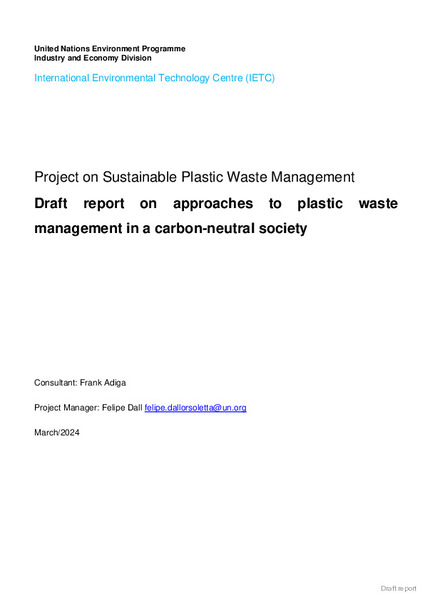| dc.contributor | Industry and Economy Division | en_US |
| dc.contributor.author | United Nations Environment Programme | en_US |
| dc.contributor.other | Adiga, Frank | en_US |
| dc.coverage.spatial | Global | en_US |
| dc.date.accessioned | 2024-08-15T05:15:43Z | |
| dc.date.available | 2024-08-15T05:15:43Z | |
| dc.date.issued | 2024-03 | |
| dc.identifier.uri | https://wedocs.unep.org/20.500.11822/46067 | |
| dc.description | This report examines the current state of the plastics economy and proposes a shift towards a circular, low-carbon model. It evaluates this transition against various scenarios, including business-as-usual, an intermediate hybrid model, and a community-driven approach. The report outlines feasible pathways to achieve this transformation, anchored by four interrelated objectives: reducing plastic consumption, transitioning to renewable feedstocks, improving recycling processes, and minimizing the carbon footprint along with other environmental impacts. These goals are designed to work in concert to eliminate environmental burdens and foster a sustainable plastics economy. To realize these ambitious targets by 2050, we must take immediate action, adopt innovative design principles and support comprehensive systemic change. | en_US |
| dc.format | pdf | en_US |
| dc.language | English | en_US |
| dc.rights | Public | en_US |
| dc.subject | plastic waste | en_US |
| dc.subject | pollution | en_US |
| dc.subject | circular economy | en_US |
| dc.subject | waste | en_US |
| dc.title | Draft Report on Approaches to Plastic Waste Management in a Carbon-neutral Society | en_US |
| dc.type | Discussion Papers, Concepts and Proposals | en_US |
| wd.identifier.sdg | SDG 8 - Good Jobs and Economic Growth | en_US |
| wd.topics | Chemicals and Pollution Action | en_US |
| wd.topics | Finance and Economic Transformations | en_US |
| wd.identifier.pagesnumber | 50 p. | en_US |


